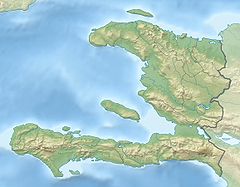Tortuga (Haiti)
|
Tortuga Île de la Tortue Turtle Island |
|
|---|---|
| Island | |

Tortuga seen from space
|
|
| A map of Haiti with Île de la Tortue to the north. | |
| Coordinates: 20°02′23″N 72°47′24″W / 20.03972°N 72.79000°WCoordinates: 20°02′23″N 72°47′24″W / 20.03972°N 72.79000°W | |
| Country | Haiti |
| Department | Nord-Ouest |
| Arrondissement | Port-de-Paix |
| Discovered | December 6th 1492 |
| Settled | 1625 |
| Area | |
| • Total | 180 km2 (69 sq mi) |
| Elevation | 459 m (1,506 ft) |
| Population (2003) | |
| • Total | 25,936 |
| • Density | 144/km2 (376/sq mi) |
| Time zone | −5 |
| • Summer (DST) | −4 (UTC) |
| Climate | Af |
|
Haiti
|
|
| Coordinates | 19°59′48.6″N 72°37′16.7″W / 19.996833°N 72.621306°W |
|---|---|
| Construction | concrete tower |
| Tower shape | tapered cylindrical tower with light |
| Markings / pattern | white and red horizontal band tower |
| Height | 14 metres (46 ft) |
| Focal height | 23.5 metres (77 ft) |
| Light source | solar power |
| Range | 14 nautical miles (26 km; 16 mi) |
| Characteristic | Fl (2) W 6s. |
| Admiralty number | J5414 |
| NGA number | 14232 |
Tortuga (or Tortuga Island) (French: Île de la Tortue, IPA: [il də la tɔʁty]; Haitian Creole: Latòti; Spanish: Isla Tortuga, IPA: [ˈisla torˈtuɣa], Turtle Island) is a Caribbean island that forms part of Haiti, off the northwest coast of Hispaniola. It constitutes the commune of Île de la Tortue in the Port-de-Paix arrondissement of the Nord-Ouest Department of Haiti.
Tortuga is 180 square kilometres (69 square miles) in size and had a population of 25,936 at the 2003 Census. In the 17th century, Tortuga was a major center and haven of Caribbean piracy. Its tourist industry and reference in many works has made it one of the most recognized regions of Haiti.
The first Europeans to land on Tortuga were the Spaniards in 1492 during the first voyage of Christopher Columbus into the New World. On December 6, 1492, three Spanish ships entered the 'Windward Passage' that separates Cuba and Haiti. At sunrise, Columbus noticed an island whose contours emerged from the morning mist. Because the shape reminded him of a turtle's shell, he chose the name of Tortuga.
Tortuga was originally settled by a few Spanish colonists. In 1625 French and English settlers arrived on the island of Tortuga after initially planning to settle on the island of Hispaniola. The French and English settlers were attacked in 1629 by the Spanish commanded by Don Fadrique de Toledo, who fortified the island, and expelled the French and English. As most of the Spanish army left for Hispaniola to root out French colonists there, the French returned in 1630 to occupy the fort and expanded the Spanish-built fortifications.
...
Wikipedia


